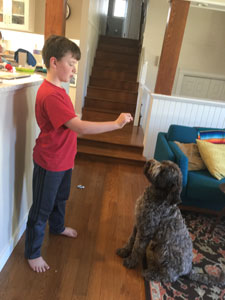- 1.250.963.7818
- npepin@telus.net
- Noel Pepin Online Courses
“But I give him everything he could want – tons of affection, the best foods, and I love him to bits. Why does he want to bite me when I touch his collar? Why does he want to fight with every dog on our walks? I just can’t take him anywhere!”
Sadly, this type of phone call is not unusual, it happens every day. Good owners and good dogs find themselves in a frustrated relationship. Conflicts can become so severe that the dog’s freedom must be limited, and in extreme cases the dog is euthanized.
All social groups, human and canine alike, establish rules. Subtle and not so subtle rewards and consequences cause the members of a group to behave as expected. Students who talk back to their teachers usually spend time in the office or in detention. Children who disobey their parents find their phone privileges or playtime curtailed. The words “You’re grounded” are familiar to all of us.
Canine groups operate in a similar fashion, but the rewards and consequences are quite different. Adult pack members don’t curtail phone privileges or send misbehaving pack members to the Principal’s Office. Instead they use gestures and sometimes even physical bumps or nips to communicate their displeasure.
It boils down to clear communication. Your dog must understand how you want them to behave. If you touch your dog’s collar and they growl, you need to express your displeasure. For some dogs, a “time out” in their kennel may get your point across. For most dogs a loud “no bite” or a pop of the leash is required.
The type of correction depends on the personality of the dog. Spraying a terrier with a mist of water can often stop excessive barking. Spraying a retriever, who loves water, will be viewed as a reward and may intensify the barking. To be most effective, plan rewards and consequences which are suited to your dog’s temperament and interests.
The intensity of the correction should be firm, but not extreme. In fact, you want to use the minimum correction necessary to change your dog’s behaviour. Corrections which are too severe may cause your dog to panic. Similar to humans, excessive stress restricts your dog’s ability to comprehend and to modify their behaviour. A calm, firm, correction is all that is required.
Consistent discipline will be the key to success. Set clear and fair expectations for your dog. They will work hard for your approval, and will willingly accept your leadership. Noel Pepin — Noel Pepin Canine Behaviour Specialists

|
Uploaded
Failed
|
 |